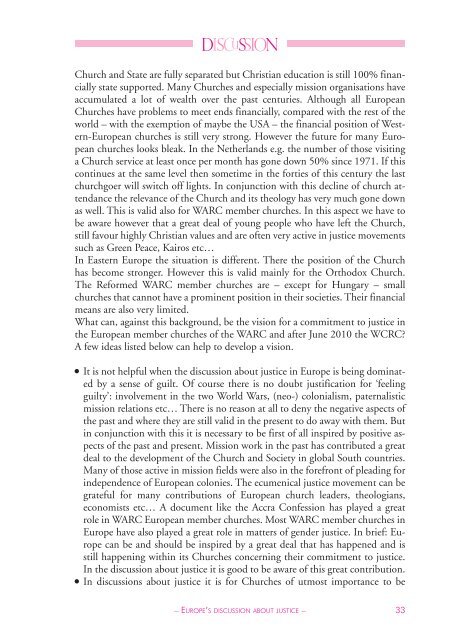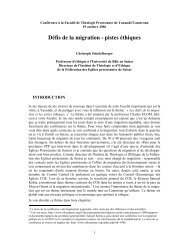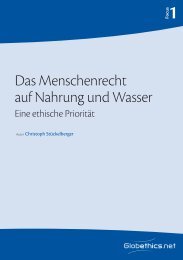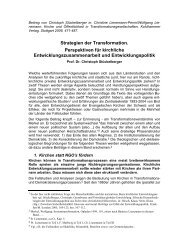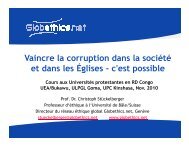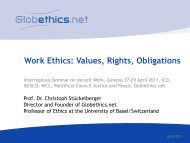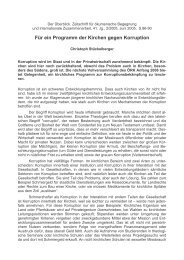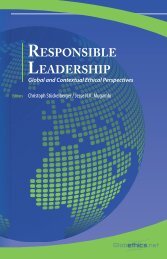BREAK THE CHAINS OF OPPRESION AND THE YOKE OF ...
BREAK THE CHAINS OF OPPRESION AND THE YOKE OF ...
BREAK THE CHAINS OF OPPRESION AND THE YOKE OF ...
Create successful ePaper yourself
Turn your PDF publications into a flip-book with our unique Google optimized e-Paper software.
Discus sion<br />
Church and State are fully separated but Christian education is still 100% financially<br />
state supported. Many Churches and especially mission organisations have<br />
accumulated a lot of wealth over the past centuries. Although all European<br />
Churches have problems to meet ends financially, compared with the rest of the<br />
world – with the exemption of maybe the USA – the financial position of Western-European<br />
churches is still very strong. However the future for many European<br />
churches looks bleak. In the Netherlands e.g. the number of those visiting<br />
a Church service at least once per month has gone down 50% since 1971. If this<br />
continues at the same level then sometime in the forties of this century the last<br />
churchgoer will switch off lights. In conjunction with this decline of church attendance<br />
the relevance of the Church and its theology has very much gone down<br />
as well. This is valid also for WARC member churches. In this aspect we have to<br />
be aware however that a great deal of young people who have left the Church,<br />
still favour highly Christian values and are often very active in justice movements<br />
such as Green Peace, Kairos etc…<br />
In Eastern Europe the situation is different. There the position of the Church<br />
has become stronger. However this is valid mainly for the Orthodox Church.<br />
The Reformed WARC member churches are – except for Hungary – small<br />
churches that cannot have a prominent position in their societies. Their financial<br />
means are also very limited.<br />
What can, against this background, be the vision for a commitment to justice in<br />
the European member churches of the WARC and after June 2010 the WCRC?<br />
A few ideas listed below can help to develop a vision.<br />
n It is not helpful when the discussion about justice in Europe is being dominated<br />
by a sense �of guilt. �Of course � there is no �doubt �justification<br />
for ‘feeling<br />
guilty’: involvement in the two World Wars, (neo-) colonialism, paternalistic<br />
mission relations etc… There is no reason at all to deny the negative aspects of<br />
the past and where they are still valid in the present to do away with them. But<br />
in conjunction with this it is necessary to be first of all inspired by positive aspects<br />
of the past and present. Mission work in the past has contributed a great<br />
deal to the development of the Church and Society in global South countries.<br />
Many of those active in mission fields were also in the forefront of pleading for<br />
independence of European colonies. The ecumenical justice movement can be<br />
grateful for many contributions of European church leaders, theologians,<br />
economists etc… A document like the Accra Confession has played a great<br />
role in WARC European member churches. Most WARC member churches in<br />
Europe have also played a great role in matters of gender justice. In brief: Europe<br />
can be and should be inspired by a great deal that has happened and is<br />
still happening within its Churches concerning their commitment to justice.<br />
In the discussion about justice it is good to be aware of this great contribution.<br />
n In discussions about justice it is for Churches of utmost importance to be<br />
��������������������������������������������<br />
� � � � ������������������<br />
�<br />
– EUROPE’S DISCUSSION ABOUT JUSTICE – 33


